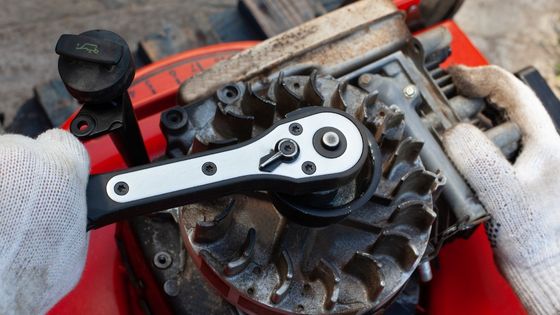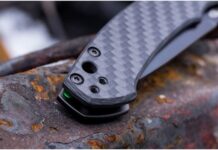A torque wrench is a tool used to tighten bolts, nuts, or other fasteners to a specific level of tightness or torque. It is designed to ensure that the fastener is tightened to the manufacturer’s recommended torque specification, which helps prevent over-tightening or under-tightening, both of which can lead to problems like stripped threads, broken parts, or unsafe conditions.
Torque wrenches come in various types, including beam-type, click-type, digital, and dial-type. Each type has its own method of indicating the torque being applied and its own advantages and disadvantages.
To use a torque wrench, you typically set the desired torque value on the tool, then tighten the fastener until the wrench clicks or indicates that the desired torque has been reached. This ensures that the fastener is tightened to the correct level of torque, which is critical in many applications such as automotive, aviation, and mechanical engineering.
There are many high-quality torque wrenchessets available on the market, but the best one for a mechanic will depend on their specific needs and preferences. However, here are some of the most popular and highly recommended torque wrench sets for mechanics:
Best Torque Wrench Set for Mechanics
- DIGITAL 1/2″DR FLEX HEAD 17-340NM: This product come with different specifications such as +/- 2° (rotating 90° at speed of 30°/sec), +/- 1% or +/- 2% for torque accuracy (CW), CW and CCW operation, Buzzer and LED indicator for pre-settable target torque or angle, Five units selectable (N-m, ft-lb, in-) Perfect product for different needs.
- 3/4″ Dr Micrometer Torque Wrench 100-600 ft/lbs: Perfect combination of accuracy and functions. Meets or exceeds ISO 6789 and ASME B107.300-2010 standards and specifications. This product comes with Pull adjustment collar feature allows you to make quick and easy torque setting changes. It’s scale markings are highly visible and easy to read.
- 1/2″Dr Electronic Torque Wrench 25.1-250.8 ft/lbs: 72-tooth ratchet mechanism with a 5° swing arc allows you to turn fasteners in tight spaces. Meets or exceeds ASME B107.28M standards and specifications. Torque alert gives a warning as you approach the target torque; vibrating handle, buzzer, and solid LED light indicate when target is reached.
These are just a few examples of high-quality torque wrench sets for mechanics. When choosing a set, it is essential to consider factors such as accuracy, durability, and ease of use to find the best one for your specific needs.
Benefits of using Torque Wrench
Using a torque wrench has several benefits. Given below are few of them:
1. Accurate Torque
One of the primary benefits of using a torque wrench is that it provides accurate and consistent tightening of bolts or fasteners. This helps prevent over-tightening or under-tightening, which can lead to issues like stripped threads, broken parts, or unsafe conditions.
2. Prevents Damage
Over-tightening of bolts or fasteners can damage the parts being fastened together, leading to expensive repairs or replacements. A torque wrench ensures that the correct torque is applied, which helps prevent damage and prolongs the life of the equipment.
3. Safety
In many industries such as automotive, aviation, or mechanical engineering, it is essential to ensure that bolts or fasteners are tightened to the correct torque specification for safety reasons. A torque wrench helps achieve this, reducing the risk of accidents or failures caused by improperly tightened bolts or fasteners.
4. Consistency
A torque wrench ensures that each bolt or fastener is tightened to the same level of torque, ensuring consistency across multiple parts or assemblies. This is essential for maintaining the quality and reliability of products.
5. Compliance
In some industries, regulatory agencies or manufacturers require that bolts or fasteners be tightened to a specific torque specification. A torque wrench helps ensure compliance with these requirements, which can prevent legal or financial penalties.
Overall, using a torque wrench is essential for achieving accurate and consistent tightening of bolts or fasteners, preventing damage, ensuring safety, maintaining quality, and meeting regulatory requirements.
Electric Torque Wrench vs Regular Torque Wrench
Both electric torque wrenches and regular torque wrenches have their advantages and disadvantages, and the choice between them will depend on the specific needs of the user.
Regular torque wrenches, such as click-type or beam-type wrenches, are mechanical tools that use a calibrated spring or beam to indicate the applied torque. They are reliable, accurate, and require no power source, making them suitable for a wide range of applications.
Electric torque wrenches, on the other hand, are powered tools that use a motor to apply torque. They typically provide higher torque outputs than regular torque wrenches and are faster and more efficient. Electric torque wrenches can also be programmed to apply specific torque values automatically, which can save time and reduce the risk of human error.
The choice between an electric torque wrench and a regular torque wrench will depend on the specific needs of the user. For example, if high torque outputs are required, an electric torque wrench may be the better choice. However, if accuracy is the most critical factor, a regular torque wrench may be preferred. Additionally, regular torque wrenches are typically less expensive than electric torque wrenches, which may make them a more attractive option for users on a budget.
Ultimately, both types of torque wrenches have their place in industry, and the choice between them will depend on the specific needs of the user and the application.




















